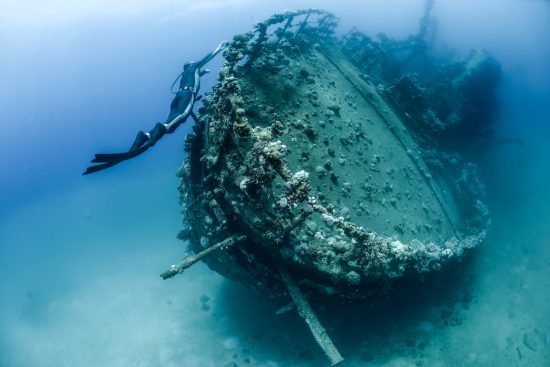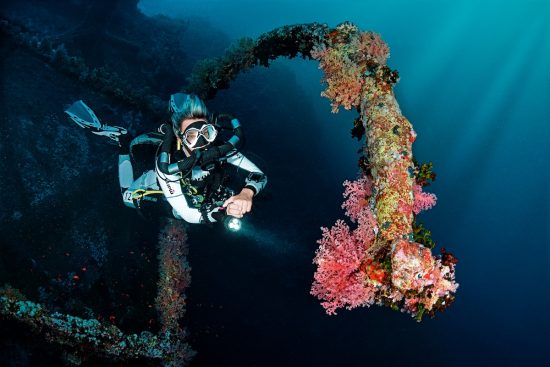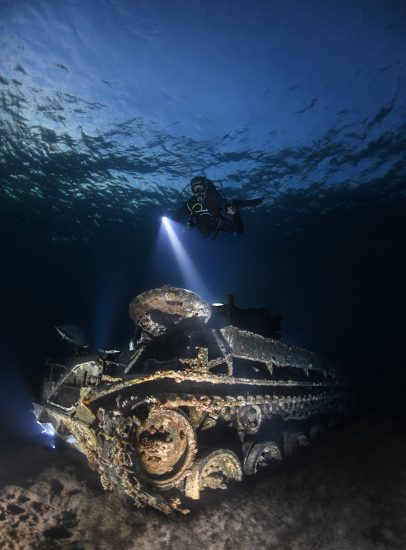Wreck diving isn’t just about descending to a sunken ship—it's about diving into history. These underwater relics tell tales of battles, cargo runs, and tragic accidents, all while supporting thriving marine life. Whether you’re peering into the rusted cargo hold of a sunken freighter or swimming alongside a warship surrounded by colorful fish, wreck diving offers a blend of adventure and discovery like no other. Ready to add some excitement to your next dive trip? Here are ten fantastic wrecks to explore, ranging from shallow dives for beginners to deep, technical wrecks.
SS Thistlegorm, Red Sea, Egypt
One of the world’s most iconic wrecks, the SS Thistlegorm is a World War II cargo ship that was bombed and sunk in 1941. The wreck is packed with wartime artifacts, including trucks, motorcycles, and rifles. Over time, it has become home to an incredible variety of marine life, including barracuda, batfish, and moray eels. This wreck is often visited by day boats and liveaboards from Sharm El Sheikh.
- Depth: 16-30m (52-98ft)
- Experience level needed: Advanced Open Water
- Best time to dive: April to June, September to November
USS Kittiwake, Grand Cayman, Cayman Islands
The
USS Kittiwake, a former submarine rescue vessel, was intentionally sunk in 2011 to create an artificial reef. It lies on a sandy bottom and offers easy access to the deck, cabins, and engine room. The wreck is one of the most popular places to go diving in Grand Cayman and hosts an array of marine life, including grouper, barracuda, and colorful reef fish. The Kittiwake is open to all experience levels; from those who have just earned their
diving license to more advanced divers.
- Depth: 4.5-18m (15-60ft)
- Experience level needed: Beginner to Advanced
- Best time to dive: Year-round
HMNZS Canterbury, Bay of Islands, New Zealand
This ex-naval frigate was scuttled in 2007 to create a dive site that’s now thriving with marine life, covered in vibrant pink jewel anemones, and home to large schools of fish. Sitting upright on the seabed, the
HMNZS Canterbury is accessible to both recreational and technical divers. You can explore the bridge, control rooms, and the helicopter hangar while spotting schools of snapper, kingfish, and nudibranchs.
- Depth: 18-36m (59-118ft)
- Experience level needed: Advanced
- Best time to dive: November to April
Zenobia, Cyprus
The
Zenobia is a massive ferry that sank in 1980 off the coast of Cyprus and rivals the
SS Thistlegorm as one of the world’s most impressive wrecks. Still loaded with trucks and cargo, it offers endless exploration for divers. The wreck is largely intact, with plenty of swim-throughs and opportunities to explore the upper and lower decks. Large groupers, barracuda, and jacks frequent the wreck, making it a favorite among experienced divers.
- Depth: 16-42m (52-137ft)
- Experience level needed: Experienced
- Best time to dive: June to October
San Francisco Maru, Chuuk Lagoon, Micronesia
The
San Francisco Maru is a technical dive located in the famous wreck graveyard of Chuuk/Truk Lagoon. This cargo ship was sunk during World War II and still carries military tanks, mines, and trucks on its deck. It’s a deep dive, but the wreck’s pristine condition and fascinating cargo make it a must-see for technical divers. Liveaboard trips are common here, allowing divers to explore multiple wrecks in the lagoon.
SS Yongala, Queensland, Australia
The
SS Yongala is one of Australia’s best wreck dives, sitting off the coast of Queensland. It sank in 1911 during a cyclone, and the wreck is now covered in corals and teeming with marine life, including sea turtles, rays, sharks, and large schools of fish. The wreck is dived from day boats departing from Townsville or Magnetic Island, and the nearby Great Barrier Reef makes for excellent alternative dives.
- Depth: 16-30m (52-98ft)
- Experience level needed: Advanced
- Best time to dive: September to December
SMS Cöln, Scapa Flow, Scotland
Located in the cold waters of Scapa Flow, the
SMS Cöln is a World War I light cruiser that was scuttled along with the rest of the German fleet. It’s one of the best-preserved wrecks in the area and offers excellent visibility in the colder months. Divers can explore the ship’s superstructure and encounter marine life such as wrasse, anemones, and crabs. Day boats operate from local harbors.
- Depth: 22-36m (72-118ft)
- Experience level needed: Advanced
- Best time to dive: April to October for the warmest water.
SS President Coolidge, Vanuatu
The
SS President Coolidge is a luxury ocean liner turned troop carrier that sank after hitting mines during World War II. This vast wreck is almost 200 meters (656 feet) long and has around 50 dive sites to explore. It is incredibly intact, allowing divers to explore rooms filled with artefacts, including a stunning porcelain statue known as “The Lady.” Marine life highlights include barracuda, reef sharks, and trevallies.
- Depth: 21-70m (69-230ft)
- Experience level needed: Advanced to Technical
- Best time to dive: April to October
HMS Hermes, Sri Lanka
The
HMS Hermes was the world’s first purpose-built aircraft carrier, sunk by Japanese aircraft in 1942. It’s one of the few aircraft carriers accessible to divers, though the depth makes it challenging. The wreck is covered in soft corals and attracts a variety of fish species, including tuna and snapper. This is a gem for technical divers.
- Depth: 42-53m (137-174ft)
- Experience level needed: Technical
- Best time to dive: April to September
Hilma Hooker, Bonaire
The
Hilma Hooker is a cargo ship that sank in 1984 and has become one of Bonaire’s most popular wreck dives. The wreck lies on its side, and divers can explore the ship’s hull and interior sections. The wreck is home to tarpon, barracuda, and a variety of reef fish. The Hilma Hooker is a shore dive, and Bonaire’s other dive sites make it a top destination for reef and
wreck diving alike.
- Depth: 18-30m (59-98ft)
- Experience level needed: Beginner to Advanced
- Best time to dive: Year-round
Kathryn Curzon, a dive travel writer for SSI (Scuba Schools International), wrote this article.
>>
Mares has a range to tech diving products, discover Mares Extended Range on our website!<<
Written by
Kathryn
Date
23rd January 2025





 Kathryn
Kathryn 23rd January 2025
23rd January 2025